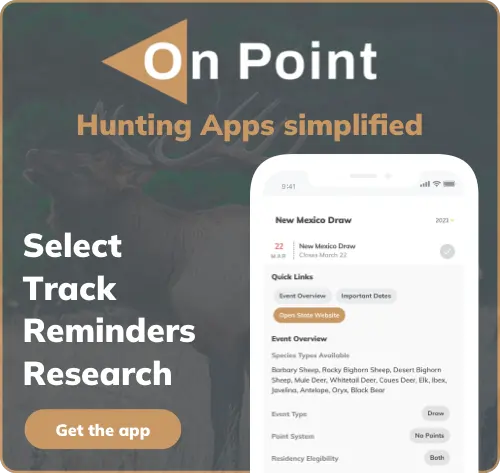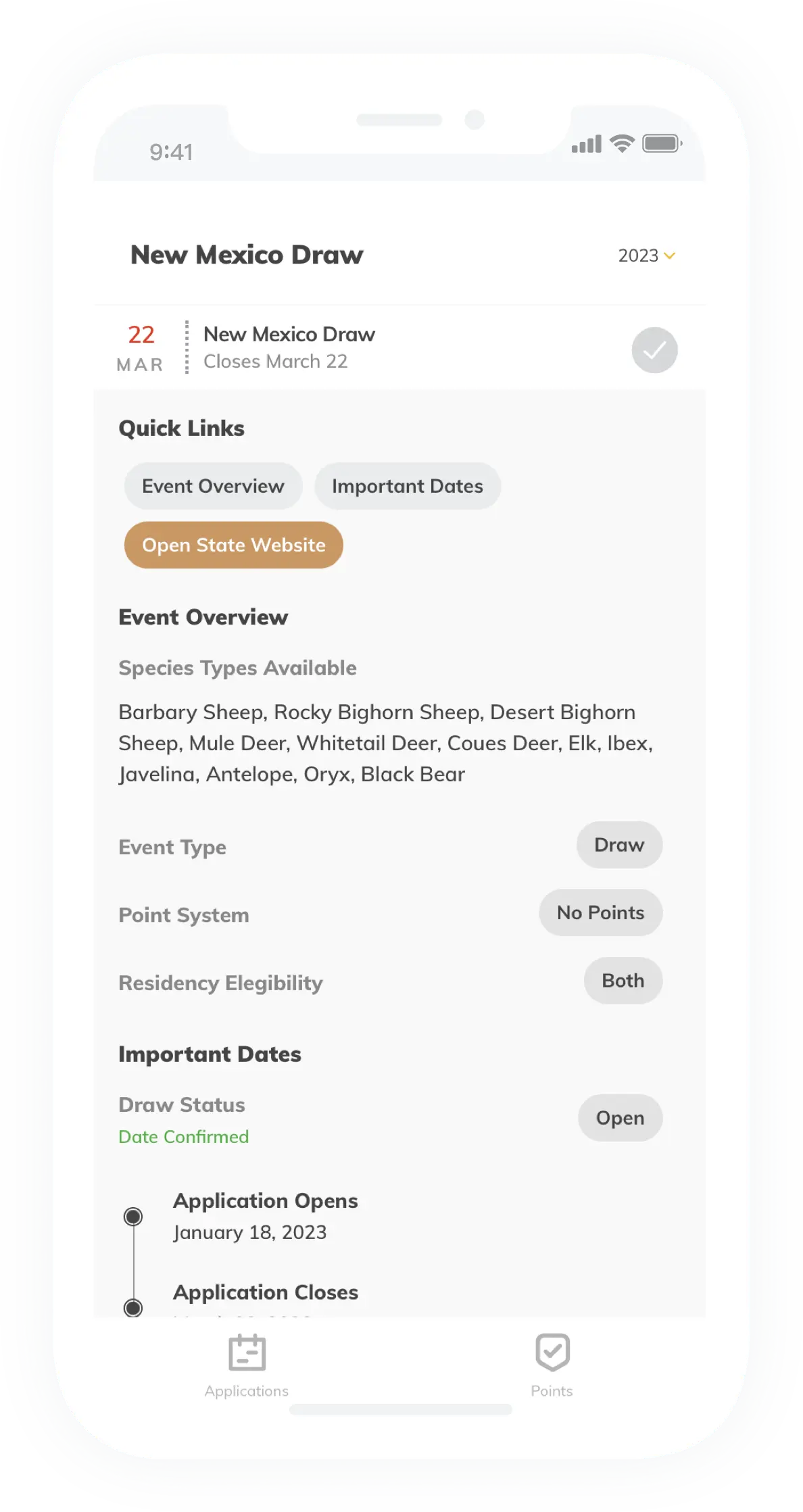Colorado Big Game Draw 2025
Colorado offers the most abundant hunting opportunities of any state, and accordingly is one of the top destinations for western hunters. Prior to 2024, the state was one of the only to offer true OTC tags on an unlimited basis in many units. However, increased demand has resulted in changes to Colorado’s nonresident tag allocation quota and application methods. Now Colorado’s limited-entry big game draw is the main method to secure opportunities for nearly all species. Managed by Colorado Parks and Wildlife, the draw is used to issue tags for elk, deer, pronghorn antelope, moose, black bear, desert bighorn sheep, Rocky Mountain bighorn sheep, and mountain goat. The draw mechanism varies by species, but applications for all species have preference points associated with them. Below we will detail how the draw works and how to maximize your chances to draw tags.
When is the Colorado Big Game Draw?
The draw opens annually on March 1st, and closes in early April. Dates have not been released for the 2025 Colorado Big Game Draw, but the expected close date is April 1st, 2025 at 8PM MT.
Below is a table of key draw dates for the big game draw. You can track your applications and get reminders in the OnPoint app so you never miss an application.
| Event | Date |
|---|---|
| Draw Opens | March 1st, 2025 (tentative) |
| Draw Closes | April 1st, 2025 (tentative) |
| Results Posted | May 28-31 |
How the Colorado Big Game Draw works
The draw process varies by species in Colorado. In all cases, residents and nonresidents are draw from the same tag pools, unless the nonresident tag allocation is hit.
The Colorado draw for Elk, Deer, Pronghorn, and Bear
Most species in the Colorado big game draw use a pure preference point system, with tags going to the highest point holders. This includes elk, deer, pronghorn, and bear. If you hope to hunt a limited-entry unit for these species, you must start applying in the draw and building points. Many quality units can be drawn with only a few points, but will be 0% draw until you reach those point thresholds. Fortunately, you can hunt OTC unlimited tags until then, or potentially secure tags through the draw via 2nd choices and not utilize your points, as detailed below.
Hunt Choices and Points
Hunters may select up to 4 hunt choices. All hunters 1st choices are considered before any 2nd choices are considered, and so on through all choices. Preference points are only used in 1st hunt choices, and hunters may earn a preference point while still drawing a 2nd or lower choice tag. These are typically 0 or 1 point tags, which is why they are sometimes still remaining after all first choices are considered. Hunters may also apply for a preference point as their 1st choice, and earn a point, but still enter 2nd through 4th choices for regular units.
Hybrid Draw System for High Demand Units
To combat non-stop point creep in high demand units, Colorado recently implemented a “Hybrid Draw” system for those units. The hybrid draw works as follows:
Hunt codes that require 10 or more resident preference points to draw, based on a rolling 3-year average for the previous three limited license draws with a 1-year lag, may issue up to 20 percent of available licenses through a random drawing. Qualified resident and nonresident hunters who select applicable hunt codes and have at least five preference points for that species will automatically enter the hybrid draw. These hunt codes must be entered as the first choice on the application. Winning applicants in the hybrid draw will be randomly selected. Hunters who successfully draw a license in the hybrid draw will lose all their preference points.
Colorado Weighted Preference Point System – For moose, sheep, and goat
The draws for Mountain Goat, Rocky Mountain Bighorn Sheep, and Moose incorporate weighted preference, which increases the probability of drawing a male, female, or either-sex license.
Applicants are originally awarded regular preference points after unsuccessful draw applications, until they have reached 3. If an applicant has three regular preference points and fails to draw their first-choice license, they will receive a weighted preference point.
Colorado describes the weighted points system in a very complicated method, so we will try simplify the description here:
- Each applicant in the draw gets a an application number.
- This application number is then “modified” via inversion, and a random number re-assignment. Stated more simply, this process simply gives each applicant a single random number in the draw.
- This number is then divided by the number of weighted preference points plus one.
- Tags are then allocated to the lowest final draw numbers, drawing in ascending order.
Given the nature of this, it is very beneficial to get to the weighted preference system, as a single weighted point would cut the draw position in half relative to no weighted points. However, there are diminishing returns as weighted preference numbers increase.
Colorado Big Game Draw Requirements
What is required to apply for a tag or point?
A valid hunting license and Habitat Stamp are required to apply for Colorado draws, including for purchasing points only. An application fee is applied per species applied for, including for points purchases. Alternate general licenses are available to satisfy the license requirement, but cost more than the annual small game license.
| Item | Resident Price | Non-Resident Price |
|---|---|---|
| Annual small game license | $35.76 | $98.92 |
| Application Fee (per species) | $8.00 | $10.00 |
| Habitat Stamp | $12.15 | $12.15 |
| Item | Resident Price | Non-Resident Price |
|---|---|---|
| Deer License | $47.91 | $481.52 |
| Elk License | $66.12 | $803.39 |
| Pronghorn License | $47.91 | $481.52 |
| Bear License | $60.05 | $251.75 |
| Moose License | $366.13 | $2,686.04 |
| Mountain Goat License | $366.13 | $2,686.04 |
| Desert Bighorn Sheep License | $366.13 | $2,686.04 |
| Rocky Mountain Bighorn Sheep License | $366.13 | $2,686.04 |
| Point Only Fee (Sheep, Moose, Goat) | $50.00 | $100.00 |
Colorado Nonresident Tags – Tag Allocations
Colorado has historically been the most friendly state out there when it comes to non-resident tag allocations, and it may still be. This is due to the large populations of game species, massive amount of huntable terrain, and relatively low success odds in many locations. That said, changes in nonresident tag allocations were approved starting the 2024 season which reduced nonresident tag allocations.. These changes will impact draw odds, likely increasing the amount of points required to draw specific units for nonresidents.
The allocation of nonresident licenses is based on the average number of preference points that an adult Colorado resident needed to draw a specific license on average during the previous three limited license draws, with a 1-year lag. For instance, the 2023 draw allocation will be determined by the 2019, 2020, and 2021 limited draws.
For elk, deer, pronghorn, or bear (previously only elk or deer) hunt codes that required six or more points for an adult Colorado resident to draw, up to 20% of the licenses may go to nonresidents. These hunts are designated in unit tables by a “+” under the SEX column. For hunt codes that required fewer than six points for an adult Colorado resident to draw an elk, deer, pronghorn or bear license, up to 25% may go to nonresidents. The latter was the approved change from prior years, and was formerly set at 35%.
If there are licenses remaining after all Colorado resident first choices have been drawn for that hunt code, nonresident allocations may increase. However, license allocations do not apply to private-land-only and Ranching for Wildlife licenses.
In a group of applications made up of both residents and nonresidents, all nonresidents in the group will count against the nonresident allocation. If the nonresident allocation is exhausted, the group will not draw. Additionally, units with low numbers of available licenses may not have any remaining for nonresidents after resident licenses are drawn.
Additional Options to get Colorado Big Game Tags
Any tags leftover after the primary draw are made available in the Colorado secondary draw. Any tags remaining after this are made available OTC, at the same time as the OTC unlimited tags go on sale in early August. Changes were made taking effect in 2025 which eliminate a number of OTC opportunities for nonresidents, namely archery elk. Below are the tentative dates for all Colorado big game tag draws and sales in 2025.
| Event | Species | Opening | Deadline |
|---|---|---|---|
| Colorado Big Game Draw | Deer, Elk, Antelope, Rocky Mountain Bighorn Sheep, Desert Bighorn Sheep, Moose, Mountain Goat, Black Bear | March 1st, 2025 | April 1st, 2025 (tentative) |
| Colorado Secondary Draw | Deer, Elk, Bear, Pronghorn | June 19th, 2025 (tentative) | June 27th, 2025 (tentative) |
| Colorado Leftover and OTC Tags Available | Mule Deer, Whitetail Deer, Elk, Antelope | August 5th, 2025 (tentative) | N/A |



